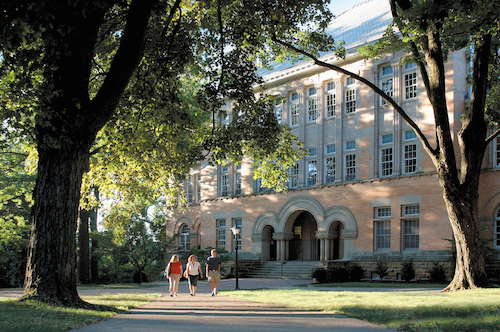The Sustainable Endowments Institute (SEI) has commended Denison University as a stellar example of collaboration between sustainability, facilities and finance staff in their efforts to implement energy efficiency projects to save carbon, energy, and money, working towards achieving carbon neutrality by 2030.
SEI recently published a case study of Denison’s Green Hill Fund, a green revolving fund (GRF). GRFs are internal funds that provide financing to parties within an organization to implement energy efficiency, renewable energy, and other sustainability projects that generate cost-savings. These savings are tracked and used to replenish the fund for the next round of green investments, thus establishing a sustainable funding cycle while cutting operating costs and reducing environmental impact.
The case study found that Denison’s implementation of their Green Hill Fund, which has been in place since 2011, already has netted benefits for the college in terms of financial return on investment, reduction of heating and electrical energy use, and raising the visibility of sustainability on the campus.
“Denison’s Green Hill Fund is a perfect example of a university that was able to immediately start saving energy on campus by getting multiple stakeholders involved,” says Shoshana Blank, senior research fellow with SEI. “Denison also proves that having some projects coming from the facilities team, and others coming from students, is a great mix for a GRF to ensure implementation of both large-scale energy efficiency and smaller-scale community sustainability projects.”
The Green Hill Fund has been so successful that Denison’s initial commitment of one million dollars will be increased to three million dollars by 2016, according to Seth Patton, Vice President of Finance and Management.
The case study reports an average return on investment rate from the Green Hill Fund of 17.7 percent, with an average payback period of 5.8 years. To date, Green Hill Fund energy projects have abated over 3,346 metric tons of carbon dioxide equivalent emissions, with the university on track to save 1,874 metric tons each year.
Potential projects for investment are chosen to align with goals of the fund, including low implementation cost, high opportunity for cost savings, significant greenhouse gas emissions reduction, significant educational or research potential, high campus stakeholder buy-in and participation and ability for long-term success.
“SEI’s case study on Denison is an affirmation of our efforts to make Denison as energy-efficient as possible and our commitment to sustainability,” says Jeremy King, sustainability coordinator for the college. “Denison's involvement with SEI has been nothing but beneficial for our institution.”
Denison is one of 47 participants in The Billion Dollar Green Challenge, an initiative from SEI that encourages colleges, universities, and other nonprofits to invest a combined total of one billion dollars in self-managed revolving funds that finance energy efficiency improvements.
